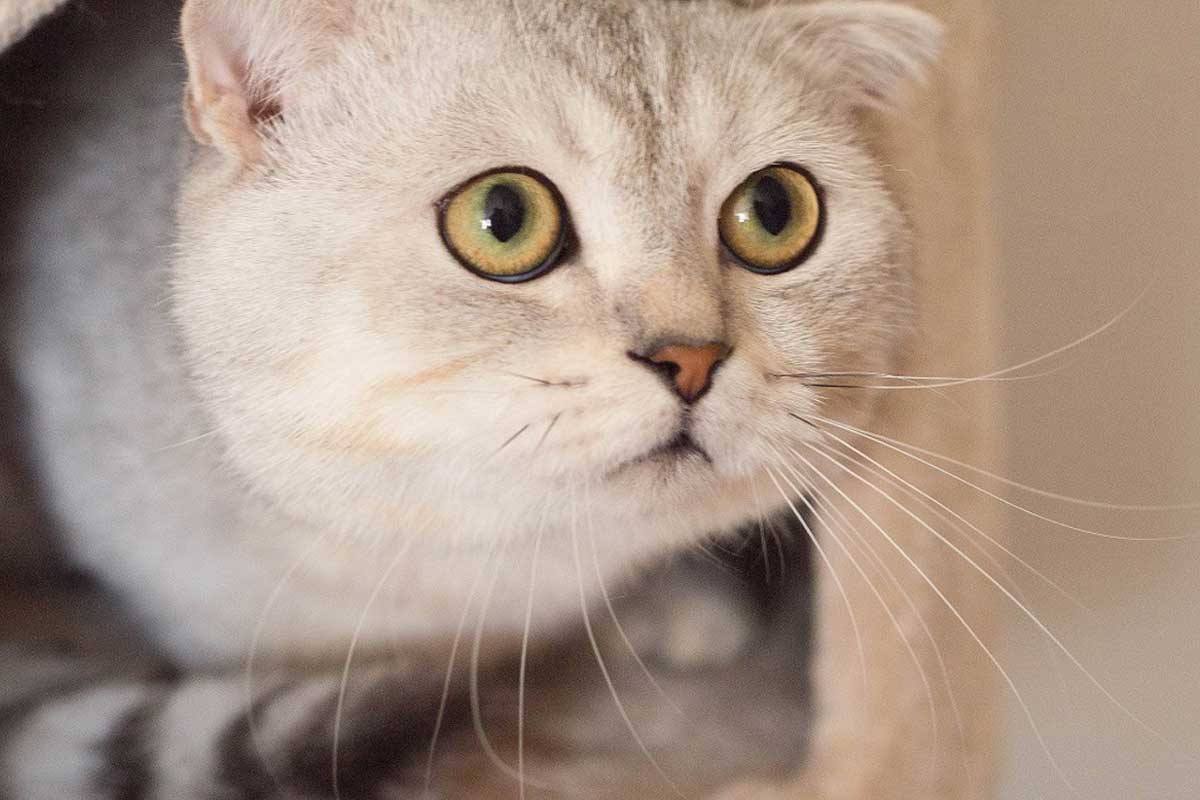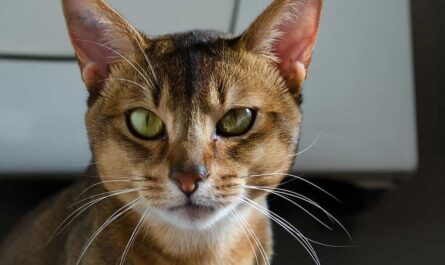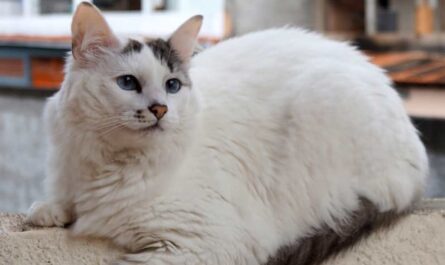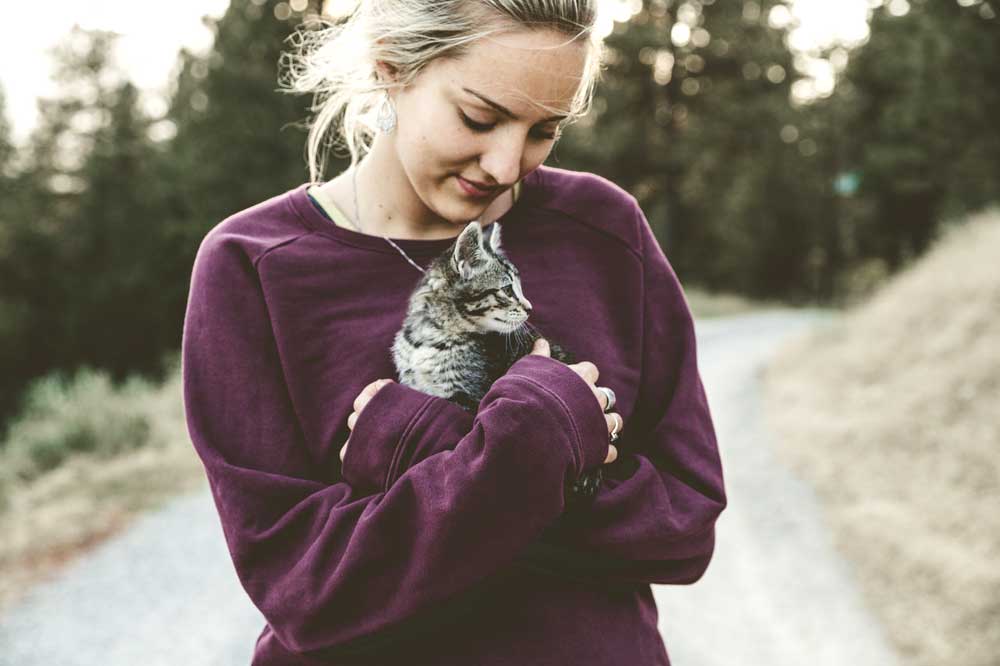The Scottish Fold cat breed, a feline rarity, has recently witnessed a surge in popularity. But what distinguishes these captivating cats? What are their characteristics, and their temperament, and should you consider owning or breeding them?
Scottish Folds, renowned for their distinctive floppy ears, are characterized by their rounded faces, bodies, and tails, resulting in an endearing round appearance. Beyond their charming exterior, they are amiable and cheerful companions, harmoniously coexisting with both humans and other pets. Their diverse coat colors and patterns further enhance their allure. However, the genetic anomaly responsible for their ear fold carries consequences beyond their unique appearance. The ear cartilage’s weakness leads to discomfort and conditions like arthritis in their later years, prompting organizations like the British Veterinary Association to advocate against their breeding and acquisition.
The Origins of Scottish Fold Cats
As the name suggests, Scottish Folds hail from Scotland, where their distinctive folded ears first emerged. The breed’s inception was rather serendipitous. In 1961, a white barn cat named Susie captured the attention of a family residing near their farm in Coupar Angus, Perthshire, Scotland. The family was drawn to Susie due to her unique ear configuration, which they likened to that of an owl, and subsequently welcomed her into their household.
When Susie became a mother, two of her kittens inherited her distinctive folded ears. One of these kittens found its way into the care of a neighbor, who happened to be a cat enthusiast well-versed in the art of feline breeding. This neighbor, William Ross, recognized the potential of this newfound breed and took the initiative to register it with the esteemed Governing Council of the Cat Fancy—a name that oozes charm! Collaborating with the GCCF and the assistance of geneticist Pat Turner, William Ross embarked on a successful breeding program that established the Scottish Fold cat breed as we know it today.
Regrettably, the original Scottish Fold, Susie, did not enjoy a lengthy and prosperous life. She passed away just a few months after giving birth to her first litter of kittens. Had she not embarked on motherhood, the breed may have faded into obscurity. Today, every Scottish Fold can trace its lineage back to Susie.
- Cat Health Supplies on Amazon
- Cat Food Supplies on Amazon
- Cat Scratching Posts for Indoor Cats
- Cat Water Fountain on Amazon
- Cat Carrier on Amazon
- Cat Automatic Feeders on Amazon
- Cat Guide Book on Amazon
Scottish Fold Cat Breed: Profile
Scottish Folds, famed for their adorable round faces and distinctive folded ears, have experienced a surge in popularity, partly due to celebrity ownership, with luminaries like Taylor Swift and Ed Sheeran among their enthusiasts.
The breed’s name is aptly descriptive; its origins trace back to Scotland, and its most defining feature is undoubtedly the folded ears. Their fur exhibits a wide spectrum of colors and patterns, with some boasting short coats and others flaunting luxurious long fur. The unmistakable earmark of this breed is its rounded visage and distinctive ears. In addition to their aesthetic appeal, Scottish Folds are cherished for their playful and joyful dispositions. Here’s a comprehensive summary of key details to illuminate your understanding of these endearing felines:
– Origin: Scotland, 1961
– Rarity: 8/10
– Appearance: Floppy ears, rounded face
– Lifespan: 15 years
– Size: Medium build and weight
– Cost: $250-1500
– Hypoallergenic: No
– Temperament: Happy, friendly, and sociable with people and other pets
– Grooming Needs: Average
– Veterinary Needs: Susceptibility to arthritis throughout life
– Dietary Needs: No special dietary requirements
Let’s now embark on a more detailed exploration of each of these aspects.
The Alluring Appearance of the Scottish Fold Cat
Describing the Scottish Fold cat in a single word? That word would undoubtedly be “round.” These felines boast an array of rounded features, from their circular faces to their large, bright, round eyes. With their distinctive ears adorably folded against their heads, their overall appearance takes on an even rounder charm.
The Scottish Fold’s defining characteristic, the feature that sets it apart from the feline crowd, is undeniably its ears. Interestingly, while many other feline features can vary widely among breeds, the Scottish Fold’s ears remain its unique identifier. These cats exhibit an astonishing array of coat colors, spanning from pristine white to soft cream, shimmering silver, deep blue, fiery red, rich brown, and sleek black. Furthermore, their fur patterns run the gamut, encompassing solid colors, striking calico, captivating bicolor, enchanting tortoiseshell, classic tabby, charming spots, intricate ticking, and much more. Amidst this diversity, their facial characteristics emerge as the true hallmark of the breed.
The reason behind this extensive variability in Scottish Folds lies in the nature of the genetic mutation responsible for their folded ears. To comprehend this phenomenon, let’s delve into genetics briefly: when breeding Scottish Folds, the crucial ear fold trait is determined by a simple dominant gene. In the context of breeding, imagine pairing a silver Scottish Fold with a standard calico cat. If the Scottish Fold cat breed passes on its dominant ear gene to its offspring, a 50% chance exists that this gene will manifest in the kittens. However, it’s essential to note that the Scottish Fold gene operates independently of factors such as coat color, fur length, and other distinguishing traits. Consequently, kittens may inherit the calico cat’s coat color and length while carrying the Scottish Fold’s ear gene.
- Buy Cat Accessories on Amazon
- The Complete Guide to Adopting a Cat: Preparing for, Selecting, Raising, Training, and Loving Your New Adopted Cat or Kitten
- Amazon Best Sellers: Best Cat Training
- Amazon Best Sellers: Best Pet Cats
- Amazon Best Sellers: Best Cat Care
- Amazon Best Sellers: Best Cat Care & Health
- Amazon Best Sellers: Best Cat Breeds
Nevertheless, as we’ll explore later, this genetic mutation imposes adverse effects on a cat’s health. Due to these concerns, organizations like the British Veterinary Association advocate against further breeding of Scottish Folds.
The Scottish Fold Cats’ Prevalence
Scottish Folds, like many distinct breeds, remain relatively uncommon in comparison to the overall cat population. The majority of cats worldwide are considered the feline equivalent of “mutts.” Consequently, locating a Scottish Fold breeder in close proximity may prove challenging.
What further contributes to the breed’s rarity is its intricate breeding process governed by genetics. To comprehend this, one must delve into the realms of genetic intricacies. The unique ear shape of Scottish Folds is the result of specific genetic factors, with a dominant gene responsible for the ear fold trait. However, breeding pairs of Scottish Folds do not guarantee offspring solely exhibiting folded ears. These cats also carry a copy of the normal ear gene, which can be inherited in the same manner as the Scottish Fold gene, leading to varied offspring.
Scottish Fold Cats’ Lifespan: How Long Do They Live?
Scottish Folds typically enjoy an average lifespan of approximately 15 years, aligning with the life expectancy of most cat breeds. While these felines do contend with breed-specific health issues, these conditions seldom impact their longevity but rather their quality of life. Notably, the prevalence of arthritis in Scottish Folds during their later years poses discomfort and pain rather than life-threatening concerns.
- Cat Products for Indoor Cats
- Cat Toys for Indoor Cats Best Sellers
- Surprise Subscription Boxes for Cool Cat On Amazon
- Build Your Cat Box. 1 Box Every 3 Months
- Litter Boxes for Your Lovely Kitten On Amazon
- Toilet Training Kit for Your Cute Cat On Amazon
Unraveling the Size of Scottish Fold Cats
Scottish Folds exhibit a medium build, with males often surpassing 12 pounds in weight and females ranging between 8 to 12 pounds. It’s important to note that their naturally round appearance can sometimes lead to misconceptions regarding their weight.
Several strategies can assist in managing a cat’s size and weight. One approach involves regulating their food intake, such as providing half a cup of dry food each morning or offering three daily wet food meals. Regularly weighing your cat enables you to monitor weight fluctuations and make adjustments accordingly. Should concerns arise regarding your Scottish Fold’s size or weight, consulting with a veterinarian is advisable to seek expert guidance.

The Price of Scottish Fold Cats: How Much Do They Cost?
Given their rarity, the cost of acquiring a Scottish Fold cat breed can vary considerably. Prospective owners should anticipate expenditures ranging from $250 to $1500. Pricing factors include proximity to breeders, the availability of kittens from a specific breeder, kitten health, coat patterns, colors, and various other considerations.
Ongoing maintenance costs for Scottish Folds tend to surpass those of an average cat due to their susceptibility to joint issues in their later years. These expenses encompass veterinary consultations, pain medications, and related care, which can accumulate over time.
To Acquire or Not to Acquire a Scottish Fold Cat?
Debates surrounding the acquisition and breeding of Scottish Fold cats raise compelling arguments on both sides. While their endearing appearance and amiable demeanor hold undeniable allure, the specter of debilitating arthritis casts a shadow over their well-being. This lifelong, incurable condition significantly diminishes their quality of life, particularly in their senior years. The breed’s unique health challenges mirror the reservations associated with flat-faced cats and dogs, which contend with breathing difficulties.
Ultimately, the appeal of cuteness and affability should not outweigh the paramount importance of a cat’s long-term welfare. Therefore, we do not advocate the acquisition or breeding of Scottish Fold cats. If you remain resolute in your decision to welcome these charming felines into your life, we strongly advise maintaining regular consultations with a veterinarian throughout their lifetimes to proactively address their specific health concerns.
Are Scottish Fold Cats Hypoallergenic?
Scottish Folds exhibit no greater or lesser hypoallergenic qualities than the average cat. This attribute is unrelated to the presence of the Scottish Fold gene and has no bearing on a cat’s propensity to shed excessively or possess long fur.
- Cat Breed Book on Amazon
- Cat Behavior Book on Amazon
- Cat Training Book on Amazon
- Cat behavior Products on Amazon
- Cat Breed Test
- GPS cat, dog, and Pet trackers
- Cat leash and harness set
Hypoallergenic properties in cats are influenced by various factors. Some long-haired breeds prove suitable for allergy sufferers, as the extended fur can inhibit the dispersion of the common cat allergen protein, Fel d 1. Conversely, some long-haired breeds may exacerbate allergies due to heavy shedding, while certain short-haired breeds with minimal shedding, such as the Devon Rex, are more compatible with allergy-prone individuals. If hypoallergenic considerations guide your choice, breeds like the Javanese (producing minimal allergens), the Devon Rex (with its allergen-trapping wavy coat), or the Russian Blue (featuring thick fur that confines allergens) may be more suitable options.
The Care and Temperament of Scottish Fold Cats
The question of whether Scottish Fold cats are easy to care for can be swiftly addressed. These delightful felines are no more challenging to nurture than your typical cat. They not only exude friendliness but also harmoniously coexist within families and alongside other furry companions.
Now, let’s delve into the intriguing realm of their temperament. Scottish Folds, renowned for their rounded ears, are equally celebrated for their joyful dispositions.
Interactions with People
Scottish Fold cats are known for their sociable and chatty nature when engaging with humans. Like all feline counterparts, their compatibility with individuals depends on gradual introductions. Establishing familiarity before full-fledged interaction tends to yield the most favorable outcomes.
Harmonizing with Other Pets
Remarkably, Scottish Folds display an exceptional affinity for forging amicable relationships with other pets. However, it remains paramount to orchestrate proper introductions between your Scottish Fold cat and other furry denizens of your abode. An appropriate initial meeting sets the stage for potential camaraderie, whereas abrupt interactions might hinder the blossoming of companionship.
- Buy Bird Accessories on Amazon
- Buy Cat Accessories on Amazon
- Buy Dog Accessories on Amazon
- Buy Fish Accessories on Amazon
- Buy Pet Accessories on Amazon
The temperament of your cat significantly hinges on its upbringing during its early weeks of life. This pivotal period serves as the canvas upon which a kitten’s perceptions of humanity are painted. Kindness and gentleness towards a Scottish Fold kitten during these formative weeks tend to bear fruit in the form of reciprocal tenderness and amiability later in life. This principle extends to how Scottish Folds interact with other pets, emphasizing the importance of positive early experiences. Importantly, these behavioral traits are not exclusive to this breed but resonate across all feline varieties.
Grooming Needs
The grooming requirements of Scottish Folds vary according to their coat length. For those adorned with long fur, diligent grooming becomes a necessity, mirroring the care routine of other long-haired breeds. Neglecting grooming can result in greasy, flaky, or even matted fur, leading to undesirable consequences. Furthermore, grooming serves to mitigate uncontrolled shedding, a boon for allergy sufferers.
Routine brushing of your Scottish Fold’s coat serves several invaluable purposes. It aids in the removal of loose shed hairs, prevents excessive grease buildup, combats unsightly skin flakes and dandruff, and upholds a neatly groomed appearance. Beyond these benefits, grooming can play a vital role in curbing potential flea infestations, as it eliminates eggs and fleas before they can escalate into a significant problem. It’s imperative to recognize that these grooming practices are pertinent to the well-being of all cats. Occasional bathing is also an option, although it is not strictly mandatory.
Veterinary Considerations
Regrettably, Scottish Fold cats harbor specific health needs stemming from the genetic alteration responsible for their distinctive floppy ears. This genetic mutation affects the cartilage in their bodies, which functions as a flexible connective tissue, akin to a hybrid of bone and muscle. Cartilage plays a pivotal role in cushioning impacts during movement and preventing bone-on-bone friction within joints. In the case of Scottish Folds, their cartilage exhibits reduced strength compared to the norm, predisposing them to a form of arthritis that afflicts every joint in their bodies.
It’s essential to note that this condition differs from other types of arthritis, as it primarily targets cartilage. The British Veterinary Association and the GCCF (Governing Council of the Cat Fancy) advise against breeding Scottish Fold cat breeds due to this predisposition. The GCCF, in fact, ceased registering Scottish Fold cats in the early 1970s, although they are still eligible for registration and exhibition with other organizations.
This genetic anomaly is irremediable, as reinforcing cartilage strength would forfeit the endearing floppy ears that define the breed. This holds true whether Scottish Folds result from crossbreeding with American Shorthairs, British Shorthairs, or any other feline lineage.
Dietary Considerations
Scottish Folds do not necessitate a specialized diet. They thrive on the same nourishment as any other domestic cat. Prioritizing wet or raw cat foods is recommended, while steering clear of dry cat foods can prevent kidney issues in their later years. For Scottish Fold cat breeds that exhibit reluctance to consume water, investing in a cat water fountain can help address this concern.
More Interesting Articles
- 23 Essential Health and Care Tips for New Cat Owners
- 14 Tips How To Introduce & Habituate a Kitten to a Cat
- 15 Top Reasons to Adopt an Older Cat Is a Good Option
- Should I Get A Cat or a Kitten? 15 Tips to Take Decision
- 19 Ways Cats Show Their Love & Affection to You
- How to Bathe Your Cat: With or Without Water, Not Do-Do
- Reasons Why Does My Cat Poop on My Bed? 16 Solutions
- Why is My Cat Pooping Outside the Litter Box: 12 Reasons
- 14 Cat or Kitten Behavior: How to Understand & Handle
- 8 Reasons to Decide Which is Better for You: Cats or Dogs?
- 34 Interesting Facts People Love to Learn about A Cat
- How to Get My Cat to Successfully Use the Litter Box
- A Complete Guide: How to Find the Perfect Cat for You
- How to Cut, Clip, or Trim Cat Nails: A Beginner’s Guide
- 30 Tips to Find the Best Way to Raise A Kitten Smoothly
- Egyptian Mau Cat Breed Profile, Care, Description, Behavior
- 10 Best Food for Older Cats with Sensitive Stomachs
- 10 Best Litter Boxes for Cats That Pees Over the Side
- 5 Best Cat Food Items for Sensitive Stomach Vomiting
- Best 5 Cat Food For Sensitive Stomach and Urinary Health



